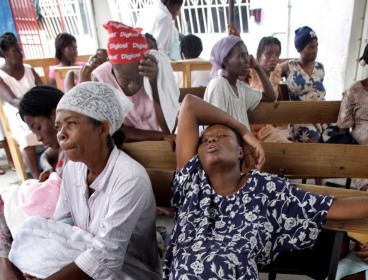ATLANTA (AP) _ A presidential panel on Monday disclosed shocking new details of U.S. medical experiments done in Guatemala in the 1940s, including a decision to re-infect a dying woman in a syphilis study.

The Guatemala experiments are already considered one of the darker episodes of medical research in U.S. history, but panel members say the new information indicates that the researchers were unusually unethical, even when placed into the historical context of a different era.
``The researchers put their own medical advancement first and human decency a far second,'' said Anita Allen, a member of the Presidential Commission for the Study of Bioethical Issues.
From 1946-48, the U.S. Public Health Service and the Pan American Sanitary Bureau worked with several Guatemalan government agencies to do medical research _ paid for by the U.S. government _ that involved deliberately exposing people to sexually transmitted diseases.
The researchers apparently were trying to see if penicillin, then relatively new, could prevent infections in the 1,300 people exposed to syphilis, gonorrhea or chancroid. Those infected included soldiers, prostitutes, prisoners and mental patients with syphilis.
The commission revealed Monday that only about 700 of those infected received some sort of treatment. Also, 83 people died, although it's not clear if the deaths were directly due to the experiments.
The research came up with no useful medical information, according to some experts. It was hidden for decades but came to light last year, after a Wellesley College medical historian discovered records among the papers of Dr. John Cutler, who led the experiments.
President Barack Obama called Guatemala's president, Alvaro Colom, to apologize. He also ordered his bioethics commission to review the Guatemala experiments. That work is nearly done. Though the final report is not due until next month, commission members discussed some of the findings at a meeting Monday in Washington.
They revealed that some of the experiments were more shocking than was previously known.
For example, seven women with epilepsy, who were housed at Guatemala's Asilo de Alienados (Home for the Insane), were injected with syphilis below the back of the skull, a risky procedure. The researchers thought the new infection might somehow help cure epilepsy. The women each got bacterial meningitis, probably as a result of the unsterile injections, but were treated.
Perhaps the most disturbing details involved a female syphilis patient with an undisclosed terminal illness. The researchers, curious to see the impact of an additional infection, infected her with gonorrhea in her eyes and elsewhere. Six months later she died.
Dr. Amy Gutmann, head of the commission, described the case as ``chillingly egregious.''
During that time, other researchers were also using people as human guinea pigs, in some cases infecting them with illnesses. Studies weren't as regulated then, and the planning-on-the-fly feel of Cutler's work was not unique, some experts have noted.
But panel members concluded that the Guatemala research was bad even by the standards of the time. They compared the work to a 1943 experiment by Cutler and others in which prison inmates were infected with gonorrhea in Indiana. The inmates were volunteers who were told what was involved in the study and gave their consent. The Guatemalan participants _ or many of them _ received no such explanations and did not give informed consent, the commission said.
The commission is working on a second report examining federally funded international studies to make sure current research is being done ethically. That report is expected at the end of the year.
Meanwhile, the Guatemalan government has vowed to do its own investigation into the Cutler study. A spokesman for Vice President Rafael Espada said the report should be done by November.
<한글기사>
미국판 마루타, 과테말라서 성병 생체실험
(워싱턴 AFP=연합뉴스) 미국이 1940년대 과테말라에서 성병 감염과 관련된 생체 실험을 하는 동안 최소 83명이 목숨을 잃었다고 당시 생체실험 프로그램을 조사한 위원회가 29일 밝혔다.
위원회는 5천500명 가량이 실험을 받았고, 1천300명 이상이 접촉이나 주사 접종 을 통해 성병에 노출된 사실을 확인했다.
위원회의 스티븐 하우저는 당시 실험으로 83명의 사망자가 있었던 것으로 생각 한다면서 성병에 감염된 1천300명 중 700명 이하가 치료를 받았다고 밝혔다.
지난해 10월 미 언론들은 정부가 1946∼1948년 과테말라에서 성병을 이용한 생 체실험을 했다고 폭로해 충격을 준 바 있다.
버락 오바마 미 대통령은 언론 보도 이후 진상을 조사할 위원회 설립을 지시했 고, 알바로 콜롬 과테말라 대통령에게 개인적으로 사과했다.
힐러리 클린턴 미 국무장관도 실험이 부도덕한 짓이었다고 유감을 표했다.
과테말라의 생체실험은 수산 레버비 미 웰즐리칼리지 교수가 존 커틀러 박사가 이끌었던 생체실험의 개요를 적어둔 서류들을 우연히 발견하면서 세상에 알려졌다.
커틀러 박사와 동료 연구자들은 페니실린이 성병 예방에 효과가 있는지 알아보기 위해 정신질환자와 교도소 수감자를 대상으로 실험을 했던 것으로 알려져 있다.





![[K-pop’s dilemma] Can K-pop break free from ‘fandom’ model?](http://res.heraldm.com/phpwas/restmb_idxmake.php?idx=644&simg=/content/image/2024/05/09/20240509050541_0.jpg&u=20240509173751)




![[News Analysis] Yoon's first 2 years marked by intense confrontations, lack of leadership](http://res.heraldm.com/phpwas/restmb_idxmake.php?idx=644&simg=/content/image/2024/05/09/20240509050612_0.jpg&u=20240509233252)







![[Today’s K-pop] NCT’s Mark to drop 1st solo album in February 2025](http://res.heraldm.com/phpwas/restmb_idxmake.php?idx=642&simg=/content/image/2024/05/10/20240510050597_0.jpg&u=)